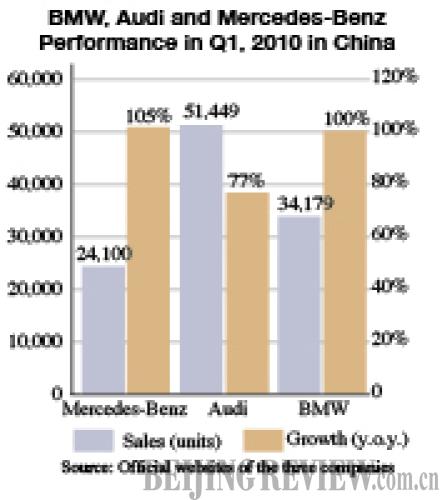|
 |
|
SHEER DRIVING PLEASURE: BMW presented a new model at the 12th Chengdu International Automobile Exhibition in September 2009 (JIANG HONGJING) |
One month ahead of the 11th Beijing International Automotive Exhibition (April 25-May 2), BMW China launched a nationwide advertisement campaign to attract Chinese consumers by integrating traditional and unique Chinese elements into its new concept cars.
The company decorated its concept cars with Beijing opera masks or depicted a BMW car running in a Chinese water painting to illustrate the company's slogan "Sheer driving pleasure" and "Joy is BMW" in a way appealing to Chinese buyers.
BMW hired renowned Chinese calligraphers to create a new writing for "joy" in Chinese. The automaker even went so far as to register the new writing for the Chinese character "joy."
"It was not possible to pitch such a large-scale advertisement with purely Chinese elements to our bosses in Munich several years ago," said Marketing Director of BMW China Zhu Liwei, "because BMW executives didn't think of China as a major car country."
BMW A.G. said on its company website on April 12 its sales in China in the first quarter of this year grew by 106 percent to 34,179 vehicles—the fastest among its markets worldwide.
At the Beijing auto exhibition in April, BMW has planned the Asian market debut for nine of its car models, including BMW Active, BMW Vision Efficient Dynamics, new BMW X5, BMW X5 M, and MINI Countryman, all of which feature fuel efficiency, innovation and low gas emission technology.
The huge potential of the Chinese market has made it increasingly urgent for BMW to sell more vehicles to obtain as large a market share as possible since its competitors have already spared no efforts on a variety of promotional activities of their own.
In 2003, BMW started to produce its cars in China instead of only selling imports. But even though its sales in China grew rapidly in the past few years, it still lags behind competitors such as Mercedes-Benz in terms of growth rate.
"The fact China is now the biggest auto market in the world has caused our headquarters to rethink how we can effectively promote BMW in the country," said Zhu, adding the current advertisement campaign is the biggest in the company's seven-year history in China.
The relationship between man and car has evolved in recent years. "Ten years ago in China, a premium car was often the symbol of wealth. Nowadays, different brands stand for different lifestyles, values and characters," said Christoph Stark, President and CEO of BMW Group in China. He said BMW has always tried to convey a young and joyful spirit to its drivers.
Confronted with increasing accusations cars are one of the major culprits of greenhouse gas emissions and global warming, Stark said BMW has taken environmental protection into full consideration.
Consumers tended to associate low-carbon emission cars using less fuel with low performance and low speed. But Stark said this was not BMW's way of reducing carbon emissions. Instead, BMW relies on innovation to reduce carbon emissions, and is researching highly efficient hybrid vehicles and electric cars as one of BMW's mid-term goals. Developing hydrogen-propelled cars is its long-term strategy, Stark said.
Larger market share
China overtook the United States as the biggest auto market in the world last year and has taken the lead in terms of car sales in the first quarter of 2010.
Auto sales soared 55.79 percent from a year earlier to about 1.74 million units in March—a new record, said the China Association of Automobile Manufacturers (CAAM) on April 9.
Half of all automobiles on Chinese streets are produced by foreign automakers or China-foreign joint ventures. As one of the first foreign companies to produce cars in China, German Volkswagen A.G. has been the best seller in both low- and high-end auto markets. In 2009, China became the biggest market for Volkswagen in the world, with its high-end Audi brand dominating the luxury car market in China for years.
BMW's major competitors in the burgeoning Chinese market include Audi and Mercedes-Benz cars. In 2009, Audi sold 157,188 cars in China, growing 33.1 percent year on year, while Mercedes-Benz sold 68,500 units in the country, a robust 77-percent increase from 2008.
In 2009, BMW sold 90,536 vehicles in China, growing 38 percent from 2008, making the country its fourth largest market after Germany, the United States and the UK. Though sales figures seemed encouraging, its growth rate fell short of the average of the national vehicle sales growth of 46 percent, says figures from the CAAM.
In the Guangdong-based Time-Weekly, Norbert Reithofer, CEO and Chairman of the Board of BMW, said BMW will develop the long wheelbase X5 series specially dedicated to Chinese customers.
He said he expected the BMW X5 series to account for at least one fifth of its total sales in 2010.
To increase its production capacity, BMW A.G. and its Chinese partner Shenyang Brilliance Jinbei Automobile Co. Ltd. have decided to jointly raise 6 billion euros to enlarge the Shenyang factory from its current annual capacity of 41,000 units to 300,000 units.

| 